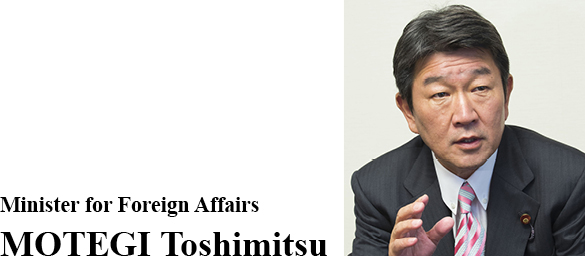Foreword
The year of 2020 was a year of confronting the crisis caused by the global pandemic of novel coronavirus (COVID-19). The Ministry of Foreign Affairs has been working tirelessly to issue the Travel Advice and Warning on Infectious Diseases in a prompt and attentive manner, strengthen border enforcement measures to prevent the spread of the virus, and give support to Japanese nationals overseas who had difficulties in leaving other countries or returning to Japan. In 2020, I visited 22 countries and held 112 telephone and video conferences. I have spent most of my days coordinating closely with the countries concerned and making maximum efforts to respond to the situations at home and abroad.
The COVID-19 pandemic is indeed a global crisis. Its response demands international coordination and cooperation, especially support for developing countries with fragile medical systems. Japan has provided over ¥170 billion ($1.54 billion) in assistance to improve the health and medical service in developing countries, and established the COVID-19 Crisis Response Emergency Support Loan, which provides up to ¥500 billion ($4.5 billion) over the course of two years to bolster economic activities in developing countries mainly in the Asia-Pacific region. And we have provided such assistance at an unprecedented speed, both bilaterally and through international organizations.
In addition, Japan aims to achieve Universal Health Coverage under the principle of “leaving no one’s health behind.” In order to fully support global equitable access to vaccines, diagnostics, and therapeutics including in developing countries, Japan immediately responded to the call for contributions to the COVAX Facility and has promoted the supply of therapeutics through the Patent Pool. These supports from Japan have been highly valued and appreciated by countries around the world.
The subtitle of this year’s White Paper is “International cooperation in the COVID-19 era: our commitment to the future.” It reflects our hopes that we can overcome the COVID-19 crisis in coordination with other countries, and that we can build a better future by strengthening health and medical systems and making our society more resilient to infectious diseases.
What we have to do for this purpose is not limited to combating infectious diseases. The year 2020 marked the first year of the Decade of Action that calls for accelerated efforts to achieve the Sustainable Development Goals (SDGs). Guided by the principle of human security, Japan will accelerate its efforts to achieve the SDGs and tackle global issues by making active and strategic use of ODA. Furthermore, in order to realize a decarbonized world, which the Paris Agreement aims for, Japan will partner with other countries and lead international efforts at this year’s COP26 and beyond by reducing its greenhouse gas emissions to net-zero by 2050, that is, to realize a carbon-neutral society.
As the security environment surrounding Japan becomes increasingly severe, Japan has advanced initiatives toward the realization of a “Free and Open Indo-Pacific (FOIP),” aiming to establish a free and open order based on the rule of law in the Indo-Pacific region, the core of the world’s vitality. A large number of countries now share and support this vision. ODA is an important tool in the effort to realize FOIP. We will strategically utilize ODA to promote quality infrastructure development so that we can enhance connectivity across the Indian and Pacific Oceans and support maritime law enforcement capacity building, etc., together with the United States, Australia, and India, as well as countries in ASEAN, Europe, the Middle East, and Africa and beyond. Through these efforts, we will advance coordination and cooperation with the countries concerned.
The White Paper on Development Cooperation 2020, Japan’s International Cooperation, records Japan’s development cooperation activities throughout 2020. In order to give you a good sense of what have been done in 2020, we put in Part I Japan’s assistance for responding to COVID-19 and our international efforts for vaccine development and deployment. It also contains interviews of Japanese personnel taking active roles in international organizations around the world, and it shows some examples where Japanese assistance provided to developing countries are particularly utilized. In addition, the columns focus on Japan’s contributions to health and medical care, including a column about a former JICA training participant at the Noguchi Memorial Institute for Medical Research in Ghana. We used social media to invite the public to nominate column topics.
It is my sincere hope that this White Paper on Development Cooperation will help you to better understand various Japanese policies and initiatives on development cooperation.
March 2021

